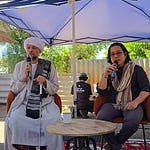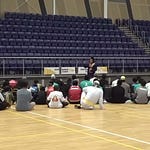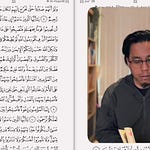TLDR;
Today, on day 67, we explored Ayah 41 of Surat al-Baqarah.
This Ayah urges the Jewish leaders in Medina to believe in the Qur'an and Prophet Muhammad ﷺ, as the Qur'an confirms the messages in their own scriptures.
They knew about the final prophet but rejected him due to prejudice.
The Ayah teaches us the importance of not just acquiring knowledge but also putting it into practice.
Let's remember to apply what we learn in our daily lives. Insha'Allah, we'll complete this Ayah tomorrow.
As-salaamu alaikum wa rahmatullahi wa barakatuh. Welcome back to BeQuranic, where we take short passages from the Quran, extract practical lessons from them, and apply these lessons to our daily lives so that we can be more Quranic.
Insha'Allah, today, on day 67 of BeQuranic, we're going to explore Ayah 41 of Surat al-Baqarah. The Ayah reads: "And believe in what I have revealed that confirms what is with you, and do not be the first to disbelieve in it, and do not trade My Ayah for a cheap price, and towards Me only shall you have taqwa."
This Ayah was revealed to the leaders of the Jewish tribes in Medina, the scholars among the Jews living there. In this Ayah, Allah said to have imaan in what He has revealed, meaning the Qur'an, and also in Prophet Muhammad ﷺ, because the Qur'an wasn't revealed like a book; it was revealed as a recitation, and the one spreading the message, the one teaching them the Qur'an, is Prophet Muhammad ﷺ.
So Allah is saying, believe in the Qur'an; by extension, you have to believe in Prophet Muhammad. And this Qur'an, Allah says, it affirms, it confirms what is with you, meaning the message is a continuation; it affirms the message in the Torah, the book that is with you, and it fulfils the prophecy in the Torah about the coming of the final prophet and messenger.
Prophet Musa said about this, Prophet Isa said about this, this message, the Qur'an and Prophet Muhammad, is confirming what is with you. And we know that the Jews in Medina, they knew about the Prophet ﷺ.
Of all places in Arabia, you find Jews during the time of the Prophet only in three locations: Khaybar, Medina, and Yemen. And all these three places are known for one thing: they are known for dates.
And Sayyidina Salman al-Farisi, he was a Zoroastrian who then became a Christian, a Unitarian Christian, who worshipped only Allah, who viewed Prophet Isa as a prophet, not as a son of God, not divine.
He said that his teachers told him that it was foretold in the previous scriptures, the coming of Prophet Muhammad in Arabia, the final prophet will come in Arabia, in a land full of dates. And in Arabia, these are the three places that were known to have plenty of dates.
The Jews, when they left Jerusalem, some of them came to Arabia and settled in Yemen, Khaybar, and Medina, waiting for the final prophet and messenger to come. And what's also interesting is that the father of Sayyidatuna Safiyya Binti Huyai, she is one of the wives of our prophet, and her father, Huyai ibn Akhtab, is one of the leaders of the Jewish tribe in Medina.
When Rasul ﷺ first arrived in Medina, Huyai ibn Akhtab and his brother went to see the Prophet ﷺ and listened to the khutbah, to the speeches of the Prophet. They came back furious. Sayyidatuna Safiyya related this incident to us. They came back furious, and the brother of Huyai ibn Akhtab, so this is the uncle of Sayyidatuna Safiyya, asked his father, is he the one? Is he the one that we've been waiting for?
Huyay ibn Akhtab said, yes, he is the one, ayu Allah. And the brother asked, so what shall we do? And Huyai ibn Akhtab said, we shall fight him until he dies or we die. So they knew that Prophet Muhammad is the true prophet, the one they have been waiting for.
But the only reason why they rejected Prophet Muhammad is because he's from an inferior race, in their opinion. The Arabs are viewed as inferior to the Jews, so they cannot accept this. So Allah says, this musaddiqalima maakum, this message is not alien to you. You know about this. It affirms what is with you. And do not be the first to reject or to disbelieve in it.
There were people already disbelieving in it, in Makkah. How is it that Allah is now telling them, do not be the first to disbelieve in it? There's a different grading of disbelief. The Quraysh didn't know about books, about prophets; the last prophet sent to them was Prophet Ismail, thousands and thousands of years ago. They didn't have a scripture with them, they didn't have a book with them. So their level of rejection out of ignorance is different from the rejection by the Jews in Medina because they are rejecting with knowledge, not out of ignorance. So the level is different.
In our lives, when we sin out of ignorance, it's a lesser degree of sin compared to knowing and not doing it. And this is why in one of the classical texts of Fiqh, Matan Zubad, it's a poem about Fiqh, it is mentioned in the poetry that a knowledgeable person who doesn't practise his knowledge will be punished before the worshippers of idols because rejecting while knowingly disobeying Allah is a greater sin than disobeying out of ignorance.
Whatever knowledge that we have, we have to make sure, no matter how little, it is put into practice. And this is why we see the tradition of the Sahaba from Sayyidina Ali ibn Abi Talib. When he taught the Qur'an, he would teach five verses. He wouldn't teach too much. And he says, those who memorise in fives will not forget. He had students who could handle more than five. And he said, no, no, five is enough. Go and study it and practise it before you take on the next load. It's not about gathering knowledge; it is about putting knowledge into practice.
There was one Sahaba who died at a very old age. In his last days, he was with his students, the Tabi'un, and they said, Alhamdulillah, today I meet Khattam of the Qur'an, finally. And these students were like, ah, is this the great Sahaba? He's 90 years old and he finally met Khattam. Most people back then would do Khattam every three days or seven days. So they found this mind-boggling; how is it that this Sahaba just finally finished the Qur'an? And they said, no, no, no, Khattam Tu bil Af'al. I finished the Qur'an with my action, with my practice. And it was this particular Ayah that finally he was given the opportunity to put into practice.
Where Allah mentioned in Surah Nour, if you want to enter into someone's house, fasta nisoo, that you should seek permission and give salaam to the owner of the house, to the host. And if the owner doesn't want to host you, he says that he's tired, go home, then you should go home. That's the end of it. You should not say that I've travelled so far to come to your house.
This great Sahaba, he was a Sahaba and everybody knew that he was a Sahabi. So if he were to knock on someone's door, no one's going to say go home. He did not get to apply that Ayah. Finally, on that day, someone had the audacity to say no to a Sahabi who's knocking on his door. The Sahaba had to leave and he was so happy. Finally, I get to put this Ayah into practice.
So what do we learn from Ayah 41? It's not about the accumulation of knowledge. It is important that we seek knowledge, but it is equally important that whatever knowledge we have, we put it into practice.










